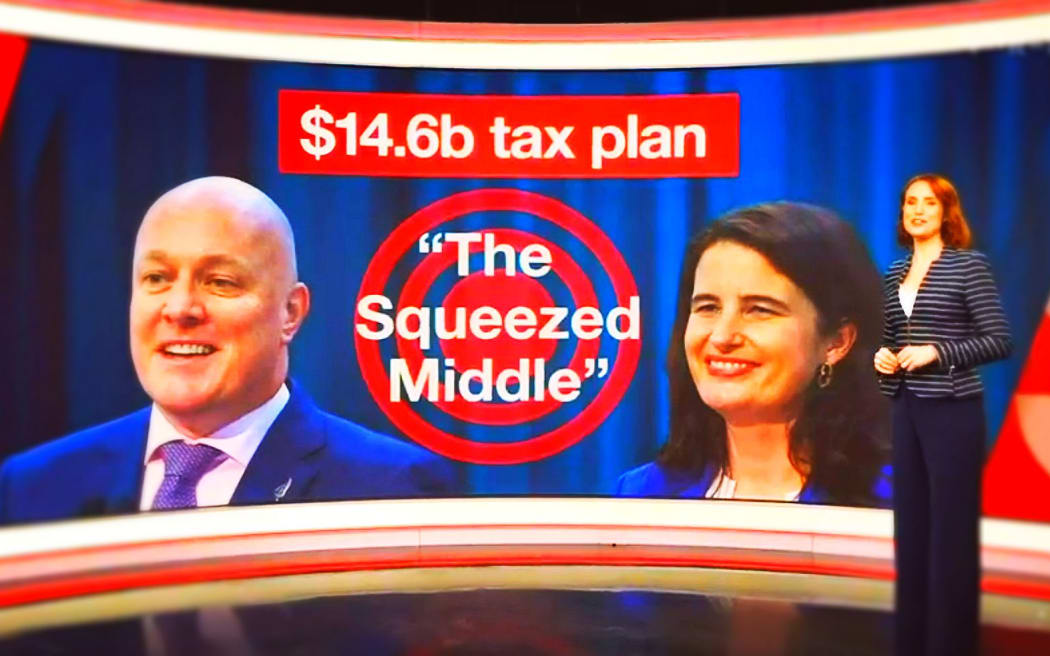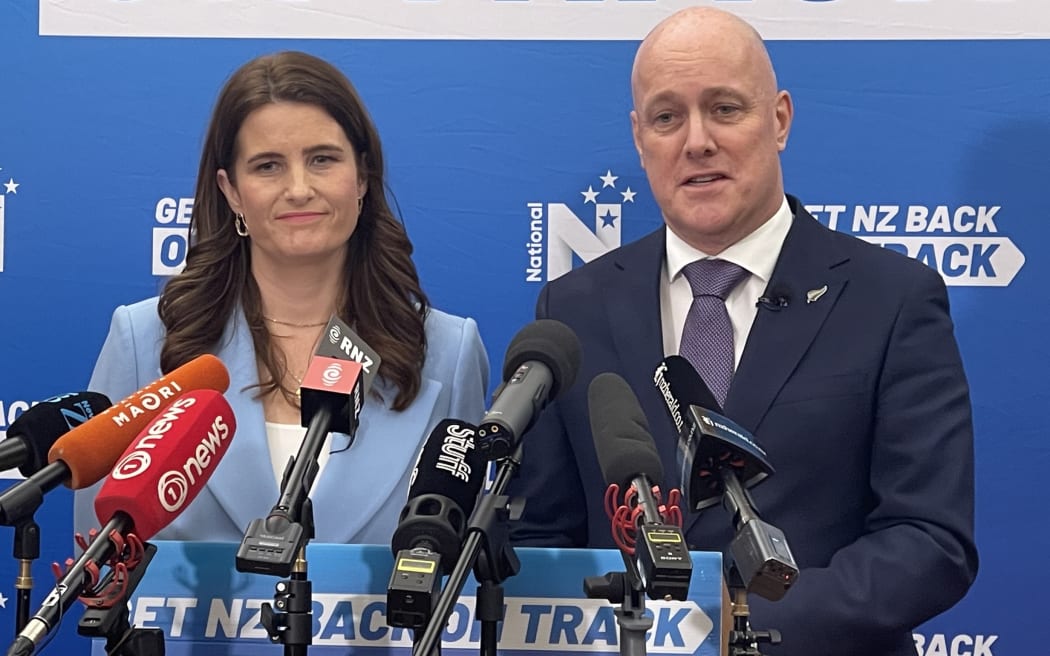As National announced its long-awaited tax plan, some journalists took a hard look at its numbers, while others focused more on political strategy and perception.

Newshub at 6 on Wednesday zeroed in on National's slogan for their election tax package. Photo: screenshot / Newshub at 6
National leader Christopher Luxon started the day of his party’s long-awaited tax policy announcement assuring Newstalk ZB’s Mike Hosking his numbers were "rock solid".
After several elections batting off accusations of fiscal holes and other budgetary misadventures, National had commissioned the consultancy Castalia Advisors to check its plan and it found them to be, in the words of the party's deputy leader Nicola Willis, "possible and plausible".
Luxon wasn’t giving Hosking all the details of his possible and plausible schemes, but he was saying who they would benefit, setting a record for use of the phrase "squeezed middle" in a five-minute timeframe.
The party’s effort to relieve the squeeze was unveiled a few hours later and that prompted a tide of headlines trumpeting the tax plan offering the average household $250 a fortnight.
That was something of a coup for National's PR team.
Not only did they get news organisations to highlight the biggest figure from their press release; they got them to use their preferred unit of measurement for people (households rather than individuals) and time (fortnightly rather than weekly).
As Thomas Coughlan noted in the New Zealand Herald, that made the figures look larger - and presumably made the party’s political sales job a little easier.
$250 a fortnight - or $125 a week as it's sometimes known - would still be a pretty good tension remover for the tightly compressed middle.
But as it turns out, National may be unclenching with one hand and squeezing with the other.
Its $250-a-fortnight saving for an average family with kids includes $150 from its Family Boost tax credit.
But that credit would also replace the 20 hours of free childcare for two-year-olds that Labour offered in this year's Budget. That could be worth around $133 a week for families - or $266 a fortnight.
That - according to a robust, consultant cross-checked Mediawatch statistical analysis - is more than $150. Or even $250 (though it is obviously more targeted and comes with less flexibility than a cash handout).
Other fishhooks were highlighted in the media as the day wore on.
TVNZ Breakfast producer Tom Day flicked through National's tax plan to find a single line noting it would scrap Labour's Community Connect scheme.
Buried on page 18 of National tax policy plan they reveal they would scrap Labour’s public transport subsidies they announced this year. This would mean that the roughly additional 774,000 children and young people who were the benefactors of cheaper fares would see them go up
— Tom Day (@tomdaynz) August 30, 2023
A doubling of public transport charges will probably feel pretty painful to some of those people, particularly minimum wage workers only getting an extra $10 a week under National’s plan.
These drawbacks didn't feature in some relatively glowing responses in the media.
Newshub’s political editor Jenna Lynch on Wednesday praised National's "masterclass of political marketing".
"National has taken what is in reality a $25-a-week tax cut for most middle earners, doubled it into a couple, doubled it into a fortnight, slapped their childcare subsidy in there, and all of a sudden they have a $250 figure to slap all over their billboards," she said.
"$20 just isn't enough to buy a vote in this economy. All of the focus groups say so. But $250 that is massive money. Genius."
That assessment was echoed by Stuff senior political commentator Tova O’Brien.
"Generally speaking, National’s tax cut plan doesn’t quite get riotous applause, instead a slow clap with a bit of awkward shuffling," she wrote.
"Politically though, a standing ovation for National’s finance spokesperson Nicola Willis."
TVNZ political editor Jessica Mutch-McKay echoed that assessment of Labour’s proposal to take GST off fresh fruit and veges. She hailed National's tax plan as a "good political move" despite the objections from experts.
While this would all be incisive analysis if it came from marketing experts, it came off as 'horse race journalism' - more concerned with public perception than policy impacts.
Delving into the '$25 truth' behind the '$250 spin' may have served audiences better than telling them how policy would look on a billboard - or postulating how it will be received by voters.
On the day National's policy was announced, Newshub's Amelia Wade did look at complications in the proposal to get rid of Labour’s ban on foreign homebuyers.
On RNZ's Checkpoint, Lisa Owen grilled Willis on whether her plans do enough for low-income workers compared to, say, a high-ranking National Party politician making $206,000 a year.
Some business journalists and economic analysts looked at National’s Castalia-checked numbers - and found a few of them wanting.
At the Herald, business editor-at-large Liam Dann said the party had made “heroic” assumptions about revenue from a tax on foreign home buyers and online gambling providers.

National Party finance spokesperson Nicola Willis and leader Christopher Luxon announce the party's tax plan. Photo: RNZ / Katie Scotcher
That was echoed by tax consultant Terry Baucher on RNZ’s Morning Report, who noted the goverment only expected its new digital services tax to raise around $55m a year, compared to $176m National projected from its online gambling tax.
"Unless the scale of it is colossal, I can't see how the numbers there will match that [$55m] number - which even then people think is a little optimistic," he told Morning Report.
Over at Newsroom, senior political reporter Marc Daalder found economists from left and right were sceptical about National’s “climate dividend” which diverts Emissions Trading Scheme revenue to pay for tax cuts.
Meanwhile, RNZ’s political editor Jane Patterson covered the upsides and downsides of the plan in a comprehensive analysis piece and RNZ digital political journalist Russell Palmer wrote a useful explainer.
A difficult task done in a hurry
Despite the efforts of those journalists and others, some of the coverage still took a surface-level view of National’s numbers - especially in the early going.
Some of that coverage parroted talking points put forward by the party - thought that’s not unique to National.
Every party likes to put its own spin on the numbers when announcing a headline policy and sometimes they sneak dubious forecasts into the media without appropriate scrutiny.
Interest.co.nz’s politics and economics reporter Daniel Brunskill told Mediawatch journalists can sometimes get hoodwinked when it comes to financial plans.
"Accounting, economics, and finance are really technical specialist skills. And people who become journalists often do so because they failed high school maths," he said.
"I'm definitely not good at maths - and I'm a financial journalist. It is difficult and we really rely on experts willing to help us.
"So I do worry that political parties often get a bit of a free pass with anything too technical, because journalists and the public just don't really have the appetite to digest it or delve into the numbers too deeply."
Brunskill said political journalists can let pre-prepared narratives about political parties influence their coverage.
Labour criticised National over its "tax cuts for millionaires" in spite of it it keeping the top 39 percent income tax rate in place, while National can benefits from its reputation as a "good financial manager.
"The first reaction piece to a policy is often 'how will this play with the voters?. What will this do in the polls? What does this mean for the election race?'," he said.
"That's completely the wrong conversation because you're putting the cart before the horse."
"The politician should make the announcement, the journalist should write about what it means and how it impacts people - and then it should have a political effect, good or bad. And then you should write about the political effects that it has or hasn't had."
Brunskill said a policy budgetary office costings unit, which has been suggested by both Labour and National (though never at the same time) would be a boon to journalists reporting tax plans like the one released this week.
"I think it would help and it would force parties to think very seriously about their policies and perhaps not announce things that aren't going to work. I think it would be helpful in that regard."
Despite that, he said wouldn't solve a fundamental problem: economic costings and forecasts are still best guesses, and prone to inaccuracy.
In the end, aspects of politics come down to who voters trust the most.
Still, that call is made easier when they're furnished by accurate, unvarnished and incisive media accounts of policies, rather than how they might play with voters in an election.


